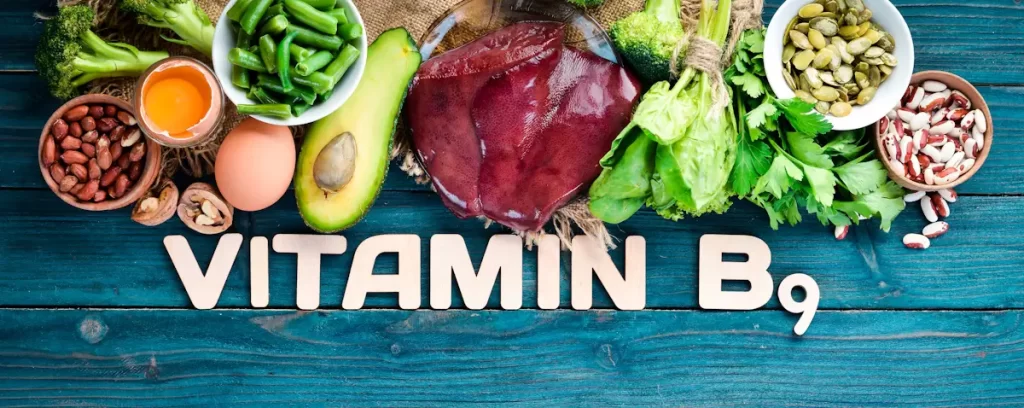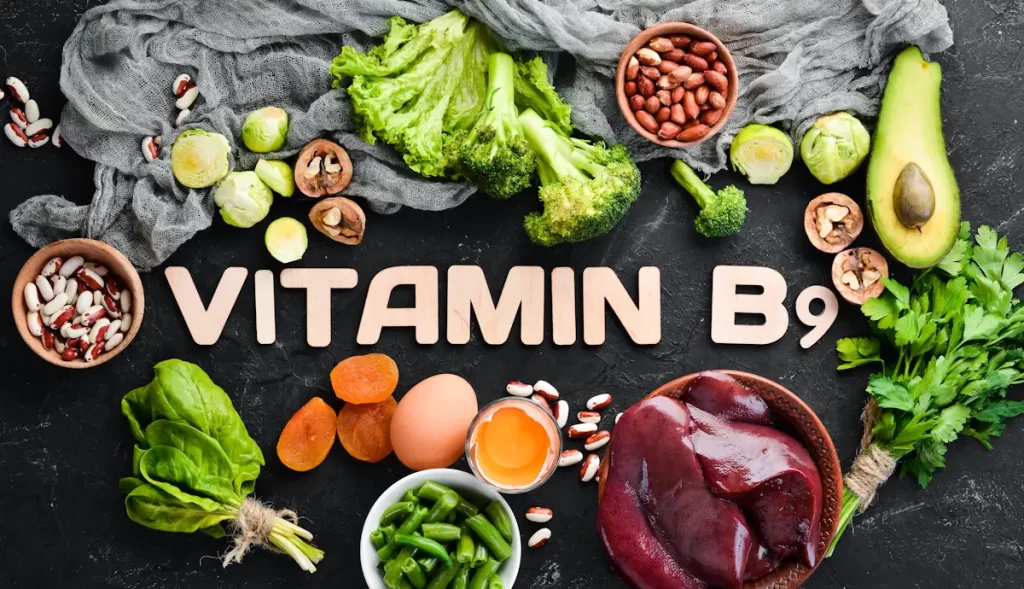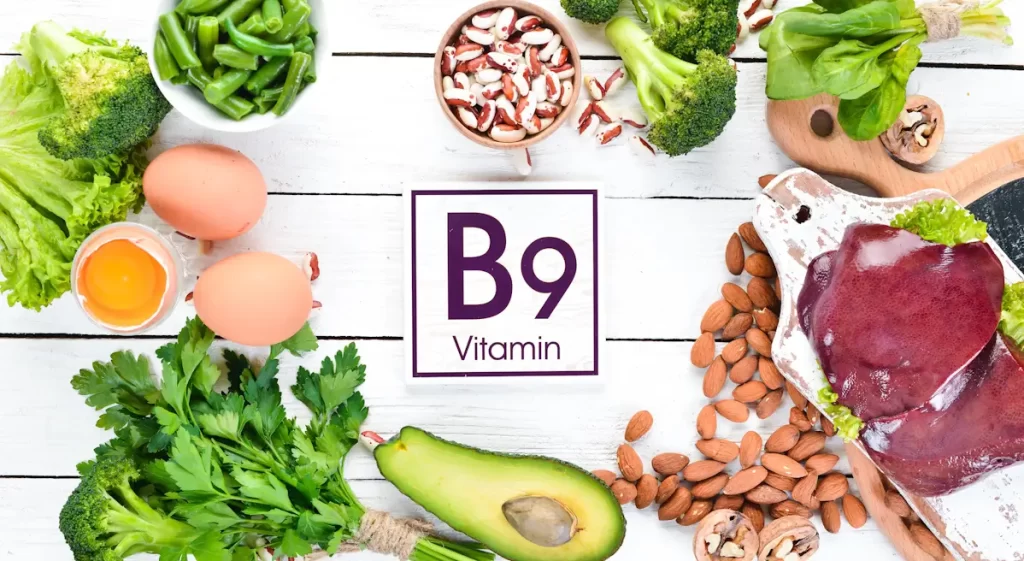Are you wondering how to boost your health with the right vitamins? Vitamin B9, also called folate or folic acid, plays a big role in keeping your body strong and healthy. This guide will explain its benefits, best food sources, and why it’s crucial for pregnancy.
Thank you for reading this post, don't forget to subscribe!Keep reading to learn what makes this vitamin so important!
Key Takeaways
- Folate (natural) and folic acid (synthetic) are forms of vitamin B9, vital for DNA production, red blood cell formation, and brain health. Folic acid is better absorbed but can build up in the bloodstream if overconsumed.
- Adults need 400 mcg of folate daily; pregnant women need 600 mcg to prevent neural tube defects like spina bifida. Supplements or fortified foods help meet these needs.
- Top sources include spinach, black-eyed peas, beef liver, enriched cereals, and fortified grains. Since 1998, U.S.-fortified grain products have reduced birth defect rates by 28%.
- A lack of folate may cause anemia, tiredness, or higher risks of heart disease and neural tube defects in babies during pregnancy if levels are too low early on.
- Excessive folic acid intake may hide vitamin B12 deficiency or increase cancer risks in people with certain conditions—stay within the tolerable upper limit (1,000 mcg/day).
Understanding Folate vs. Folic Acid
Folate and folic acid are two forms of vitamin B9. They share similar roles in the body but come from different sources.
Definition of Folate
Folate is the natural form of vitamin B9 found in foods like leafy greens, black-eyed peas, and beef liver. It helps the body grow cells, make DNA, and process amino acids for protein.
In your digestive system, folate changes into 5-methyltetrahydrofolate (5-MTHF), its active form. This makes it ready for use by your body to support essential functions like red blood cell production and brain health.
Definition of Folic Acid
Folic acid is the man-made form of vitamin B9. It shows up in dietary supplements and fortified foods like cereals, breads, and pastas. Unlike natural folate found in foods such as spinach or black-eyed peas, folic acid is easier for your body to absorb.
One microgram (mcg) of folic acid equals 0.6 mcg Dietary Folate Equivalents (DFE) when eaten with meals. If taken on an empty stomach through a supplement, it provides 0.5 mcg DFE per microgram.
The U.S. Food and Drug Administration recommends using folic acid supplementation during pregnancies to lower risks of neural tube defects like spina bifida in babies.
Key Differences and Uses
Folate is natural and found in leafy greens, citrus fruits, and beans. Folic acid, on the other hand, is synthetic. It’s added to fortified foods like bread, pasta, and cereals. Your body absorbs folic acid more easily than folate from food.
Excess folic acid that isn’t metabolized can stay in your blood. This may lead to health risks if consumed in high amounts over time. Folate from food doesn’t cause this issue.
Both forms are used for preventing birth defects like spina bifida during pregnancy or treating folate deficiency symptoms like megaloblastic anemia.
Recommended Daily Intakes of Folate
Folate needs vary for different people. Your age, health, and life stage affect how much you should aim to consume.
General Population
Adults aged 19 and older need 400 mcg of folate daily. This is the Recommended Dietary Allowance (RDA) to maintain good health and prevent deficiencies. Most people can meet this amount through a balanced diet with leafy greens, fortified cereals, and beans.
Children’s needs vary by age. Their upper limits range from 300 to 800 mcg per day. Parents should monitor their intake closely, especially if kids consume multivitamin supplements or enriched grains regularly.
Pregnant Women
Pregnant women need 600 mcg of folate daily. This amount supports fetal development and helps avoid birth defects. Neural tube defects (NTDs), like spina bifida, occur early in pregnancy if folate levels are too low.
Supplements play a key role since diet alone may not provide enough. The CDC recommends 400 mcg of folic acid per day for all women of childbearing age to prevent NTDs. Foods enriched with folic acid, such as grains, have been fortified since 1998 by the FDA—offering an extra boost to meet those needs.
Individuals with Specific Health Conditions
People with malabsorptive disorders, like celiac disease, may struggle to absorb vitamin B9. They might need higher folate intake or supplements. Those with MTHFR gene issues can also face problems processing folic acid.
Their doctors often recommend active forms of folate, like folinic acid.
Women who’ve had pregnancies affected by neural tube defects must take larger doses—4,000 to 5,000 mcg/day—under medical supervision. This reduces the chances of future birth defects like spina bifida in their babies.
Always follow a doctor’s advice for proper dosages to stay safe.
Major Food Sources of Folate
Folate comes from leafy greens, beans, and certain fruits—find out which foods can boost your intake!
Natural Sources
Dark leafy greens like spinach, kale, and Swiss chard are rich in vitamin B9. Broccoli, Brussels sprouts, asparagus, and mushrooms also contain high levels of folate.
Legumes such as black-eyed peas, lentils, and kidney beans provide excellent amounts too. Liver from beef or chicken is a top source. Other options include nuts like peanuts and almonds, fruits like oranges and bananas, seafood such as crab, eggs, dairy products, and lean meats.
Fortified Foods
Fortified foods help fill nutrient gaps in diets. Common items include bread, cereals, pasta, rice, and corn masa flour. In 1998, the FDA required adding 140 mcg of folic acid per 100 grams to grain products.
This step reduced neural tube defects in newborns significantly.
These enriched grains provide a steady source of vitamin B9 for many people. Fortification also helps pregnant women meet their recommended dietary allowance (RDA). Examples like enriched cereals or whole grains are affordable and widely available in grocery stores across the U.S.

Folate Deficiency: Risks and Symptoms
Folate deficiency can lead to serious health problems, like anemia and developmental issues in babies. Learn how to spot risks early and protect your health here!
Common Symptoms
Tiredness is a common sign of folate deficiency. It can cause megaloblastic anemia, leading to fatigue and weakness. Mouth sores, irritability, and difficulty concentrating may also appear.
High homocysteine levels often show up with low folate intake. This increases the risk of heart disease or cardiovascular events over time. Early symptoms should not be ignored to prevent severe health issues.
Risk Groups
Women of childbearing age are at higher risk for folate deficiency. This is because their bodies need more vitamin B9 to support pregnancy. Pregnant women especially require folate to prevent neural tube defects like spina bifida in babies.
People who use alcohol frequently may also face this issue. Alcohol blocks the absorption of folate and lowers its levels in the body. Those with MTHFR gene mutations or malabsorptive disorders, such as celiac disease, are often unable to process folic acid properly.
Health Benefits of Adequate Folate Intake
Getting enough folate can improve heart health, support brain function, and help the body create healthy red blood cells—learn how it impacts your well-being!
Reduces Risks of Neural Tube Defects
Daily intake of 400 mcg folic acid lowers the chance of neural tube defects (NTDs). These birth defects, like spina bifida and anencephaly, affect a baby’s brain or spine. Fortifying foods with folic acid in the U.S. decreased NTD cases by 28%.
Pregnant women should focus on getting enough through prenatal vitamins and fortified grains.
Folate helps prevent these issues during early pregnancy when the fetus develops rapidly. It’s crucial to take supplements even before conception since many pregnancies aren’t planned.
Enriched grains, leafy greens, and fortified cereals also boost folate levels for added protection against congenital anomalies.
Supports Cardiovascular Health
Folic acid can help lower the risk of cardiovascular disease. It reduces homocysteine levels, an amino acid that makes heart problems more likely. High homocysteine is linked to strokes and high blood pressure.
Research shows folic acid supplements cut stroke risks by 21%–25%. Fortified foods like enriched grains or cereals make it easier to get enough vitamin B9 daily for heart health.
Adding natural sources, such as spinach or black-eyed peas, supports your cardiovascular system even more.
Enhances Brain Health
Low folate levels can harm brain health. Studies link low folate to dementia and Alzheimer’s disease, especially in older adults. Folate helps reduce cognitive decline by supporting healthy nerve function.
It plays a key role in producing neurotransmitters, which send signals in the brain.
Maternal folate is vital for fetal brain development during pregnancy. Adequate intake lowers risks of neural tube defects like spina bifida. Foods high in folate—like black-eyed peas, brussels sprouts, and fortified foods—can boost mental clarity over time…
Next up, learn how it aids red blood cell formation!
Aids in Red Blood Cell Formation
Vitamin B9, also called folate, helps your body make red blood cells. These cells carry oxygen through your bloodstream to keep you healthy and full of energy. Without enough folate, the body can’t produce normal-sized red blood cells.
This can lead to megaloblastic anemia, causing fatigue, weakness, or even dizziness.
Pregnant women need higher amounts of folate as it supports rapid cell growth for the baby. Foods rich in vitamin B9—like black-eyed peas, beef liver, and fortified foods—keep levels balanced.
Folate supplementation is often recommended to ensure proper daily intake for strong health and steady energy production.

Folate’s Role in Pregnancy and Fetal Development
Folate plays a big role in early pregnancy. It supports the baby’s growth and helps prevent serious birth problems.
Importance in Early Pregnancy
Adequate intake of folic acid in early pregnancy helps prevent birth defects like spina bifida. Neural tube defects can develop within the first 28 days, often before a woman knows she’s pregnant.
The recommended dietary allowance (RDA) for women of childbearing age is 400 to 1,000 mcg daily. Fortified foods and supplements make it easier to meet these needs. Doctors often recommend starting folic acid even while planning a pregnancy to ensure proper levels from the start.
Recommended Supplements for Pregnant Women
Pregnant women should take 600 mcg of folic acid daily. This helps prevent birth defects, like neural tube defects, in babies. Women with a history of pregnancies affected by these defects need 4,000 mcg every day.
Folic acid is available in prenatal vitamins and fortified foods. Pair it with other nutrients like vitamin B12 for added benefits. Always follow your doctor’s advice on supplements during pregnancy to ensure safety and proper dosage.
Interaction with Other Prenatal Nutrients
Folate works closely with vitamin B12 during pregnancy. Together, they help form red blood cells and support DNA production. A lack of B12 can block folate’s full potential even if intake seems adequate.
This balance reduces the chances of megaloblastic anemia by 79%.
Iron also plays a critical role alongside folate. Both are vital for healthy fetal development and preventing preterm delivery or low birth weight. Calcium, zinc, and vitamins like B6 all interact with folate to promote proper growth in babies.
A diet rich in black-eyed peas, enriched grains, and fortified foods offers these nutrients together naturally.
Potential Health Risks from Excessive Folate
Too much folate can cause hidden vitamin B12 deficiency and may lead to health problems—explore how to manage intake wisely.
Symptoms of Overconsumption
High folic acid intake can hide a vitamin B12 deficiency. This can lead to nerve damage, fatigue, or tingling in the hands and feet. Over time, it may cause serious health issues like megaloblastic anemia.
Too much folate might speed up mental decline in older adults. Research links this to memory loss and confusion. Stick to the tolerable upper intake level (UL) of 1,000 mcg daily for safety.
Always check with your doctor before taking high-dose supplements.
Managing High Folate Intake
Excessive intake of folic acid can lead to health risks. The tolerable upper intake level (UL) for adults is 1,000 mcg per day. High levels may mask a vitamin B12 deficiency, leading to nerve damage over time.
Some studies suggest overconsumption might promote cancer cell growth in those with a history of cancers like colorectal cancer.
Stick to natural sources like black-eyed peas or beef liver and fortified foods in moderation. Supplements should only be taken when recommended by a healthcare provider. Always check labels for daily value percentages to avoid going beyond the UL limit set by the U.S. Food and Drug Administration (FDA).

Folate and Chronic Conditions
Folate plays a key role in managing long-term health issues like cancer and mental decline—read on to explore its impact further.
Impact on Cancer
A daily intake of around 900 mcg of folate was linked to a 30% lower risk of colorectal cancer in the NIH-AARP Diet and Health Study. Folate helps maintain healthy DNA, reducing harmful mutations that can lead to cancerous cells.
This makes it important for supporting cellular health.
High levels of serum folate might not always be good. Some studies suggest elevated levels could increase prostate cancer risks. Balancing your intake is key to avoiding potential issues…
especially if consuming fortified foods or mineral supplements high in vitamin B9.
Next: Explore how folate connects with cognitive function and dementia risks!
Relationship with Cognitive Function and Dementia
Low folate levels link strongly to cognitive decline and dementia, including Alzheimer’s disease. Studies show reduced folate may impair brain function over time. This deficiency can lead to memory problems or slower thinking ability in older adults.
A meta-analysis found that folate supplementation significantly improved cognitive performance. Maintaining healthy vitamin B9 levels supports brain health and may lower dementia risks.
Folate-rich foods like black-eyed peas, spinach, and fortified grains help maintain these levels effectively.
Influence on Depression and Mental Health
Folate plays a big role in mental health. Studies suggest folate supplements, especially levomefolic acid, may improve symptoms of major depressive disorder. Low folate levels often link to higher risks of depression.
Some people have MTHFR polymorphisms, which affect how their bodies process folate. This can make them more prone to depression or other mood issues. Foods rich in vitamin B9—like black-eyed peas, kidney beans, and enriched grains—support brain health and emotional well-being.
Interactions of Folate with Medications
Some medications can lower how your body uses folate. Others might need you to take extra folate for balance—talk to a doctor before adjusting intake.
Methotrexate
Methotrexate is a drug often used to treat rheumatoid arthritis. It works by slowing the immune system, which helps reduce inflammation and joint damage. While effective, it can cause side effects such as nausea or mouth sores.
Folic acid is given alongside methotrexate to minimize these issues. A common dose is 5 mg of folic acid weekly, taken on a separate day from methotrexate. This pairing ensures better tolerance without reducing the drug’s effectiveness for conditions like arthritis or psoriasis.
Antiepileptic Medications
Antiepileptic medications (ASMs) lower folate levels in the body. This can raise the risk of folate deficiency, which may cause issues like megaloblastic anemia or fatigue. People on ASMs should monitor their folate intake to avoid these problems.
Women taking antiepileptics and planning a pregnancy need extra care. Low blood folate levels during early pregnancy increase the chance of neural tube defects in babies, such as spina bifida.
Periconceptional supplementation with folic acid helps improve neurodevelopmental outcomes for the fetus. Regular check-ups and prenatal vitamins are crucial for managing this risk effectively.
Sulfasalazine
Sulfasalazine, often used to treat inflammatory bowel disease (IBD), can interfere with folate absorption. It blocks the reduced folate carrier, which helps move folate into cells.
This can lead to lower levels of vitamin B9 in the body.
Patients with IBD may need more folic acid to make up for this issue. Experts recommend up to 15 mg of supplementation daily. Without enough folate, risks like megaloblastic anemia and other health problems increase.
Always pair this prescription drug with proper dietary or supplementary care for better results.
How to Ensure Adequate Folate Intake
Eating a variety of folate-rich foods can help meet your body’s needs. Consider supplements if you have trouble getting enough through diet alone.
Dietary Tips
Include more leafy greens like spinach and lettuce in meals. Add brussels sprouts, broccoli, or black-eyed peas to dishes for a folate boost.
Snack on oranges or fortified cereals for extra vitamin B9. Cook with enriched grains like rice or pasta to meet your dietary folate equivalents (DFE). Choose beef liver or chicken liver occasionally as rich sources of vitamin B9 too.
When to Consider Supplements
Some people may need folic acid supplements. Pregnant women, for example, should take 400–800 micrograms daily to prevent neural tube defects like spina bifida in their babies. This is most effective during the early weeks of pregnancy.
Those with MTHFR gene variations might not absorb natural folate well. They could benefit from supplements containing methylated forms of vitamin B9. Always check with a doctor before starting any supplement.

Understanding Vitamin B12: Key Benefits, Dietary Sources, and Managing Deficiency
Vitamin B12 helps the body make red blood cells and use iron better. It also boosts brain health and keeps nerves working well. Low levels can cause tiredness, numb fingers or toes, or memory issues.
Adults need 2.4 mcg daily, while pregnant women require 2.6 mcg to support their baby’s growth.
You can find Vitamin B12 in beef liver, chicken liver, fish like salmon or tuna, eggs, milk, and fortified foods such as cereals. Vegetarians may need supplements since plants lack this vitamin.
Left untreated, a deficiency could lead to megaloblastic anemia—where red blood cells grow abnormally large but can’t function properly. Eating a balanced diet prevents such risks effectively!
FAQs on Folate
Get clear answers to common questions about folate—its role, sources, and health impacts.
Common Questions and Expert Answers
How much folate do pregnant people need daily? Experts recommend 600 micrograms of dietary folate equivalents (DFE) per day for pregnant individuals. This higher amount supports fetal growth, prevents neural tube defects like spina bifida, and aids in red blood cell production.
Can you get enough folate from food alone? While foods like brussels sprouts, black-eyed peas, beef liver, and kidney beans are rich in vitamin B9, some may still need supplements.
Fortified foods or prenatal vitamins with folic acid can help meet the recommended dietary allowance (RDA), especially during pregnancy or when breastfeeding.
Conclusion
Folate is crucial for health, especially during pregnancy. It supports red blood cell production, heart health, and brain function. You can find it in leafy greens, fortified foods, and supplements.
Maintaining the right balance prevents risks like birth defects and anemia. Focus on a folate-rich diet to stay healthy!
